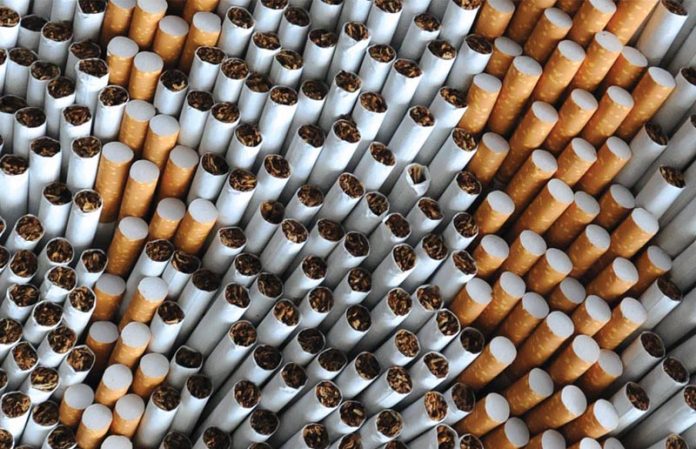
KARACHI: Following the imposition of different taxes on the legal cigarettes industries in Pakistan, the legal domestic sales were estimated at 45.1 billion cigarettes in 2017, falling by 7.4 per cent in comparison with 2016, a report of the Oxford Economics (OE) said here on Friday.
According to the report, legal sales have now fallen in every year since the beginning of the Asia Illicit Tobacco Indicator research programme in 2012.
Consequently, the total volume of legal domestic sales in 2017 was nearly 30 per cent lower than in 2012, the report claimed.
The main reason behind the falling sales of cigarettes in Pakistan, the report said, the government has steadily increased the Federal Excise Duty (FED) rate over the past decade, from Rs352 per 1,000 cigarettes in 2008 to Rs1,649 per 1,000 at the beginning of 2017 (based on the Most Sold Brand).
This is equivalent to an annual average rate of increase of nearly 19 per cent.
In July 2017, the government amended the structure of the FED by introducing a new third tier covering low-cost cigarette brands in an effort to encourage producers of illicit tobacco to formalize in the market.
The price of the most sold brand was Rs48 ($0.46) per pack of 20 cigarettes in October 2017. Prior to the introduction of a new third tier FED in July 2017, the price of the most sold brand was Rs72 (USD 0.69) per pack of 20 cigarettes.
However, the most sold brand was repositioned into the new low-tax-tier following the restructure, resulting in a decline in the applicable FED to Rs800 per 1,000 cigarettes from Rs1,649.
As a result, the price of 20 cigarettes of the most sold brand declined by one-third.
Oxford Economics (OE) prepared the report in accordance with specific terms of reference agreed between Philip Morris International Management SA, an affiliate of Philip Morris International (PMI), and OE.
The results from an empty pack survey and Nielsen retail audit data were combined with IMS data on legal domestic sales to estimate the total consumption of cigarettes in Pakistan.
Total consumption (legal and illicit) was estimated at 77.8 billion cigarettes in 2017, falling by 10.3 per cent in comparison with 2016. Of this, an estimated 58.0 per cent was Legal Domestic Consumption, 0.1 per cent was Non-Domestic Legal, and the remaining 41.9 per cent was estimated to be Illicit consumption.
Illicit consumption continued to be primarily composed of domestic illicit cigarettes in 2017.
Domestic illicit cigarettes accounted for nearly three-quarters of all illicit cigarettes consumed 2017.
Illicit consumption declined by an estimated 14.0 per cent in 2017 to 32.6 billion cigarettes, underpinned by an 11.4 per cent decline in domestic illicit and a 20.5 per cent fall in non-domestic illicit, the report said. This is the first time since 2013 that illicit consumption has fallen in Pakistan.
The decline in illicit consumption coincides with a series of regulatory and enforcement initiatives aimed at reducing the volume of illicit cigarettes consumed in Pakistan.
In January 2017, the Federal Board of Revenue (FBR) constituted a joint committee for the monitoring, vigilance, and scrutiny of the cigarette/tobacco sector in response to the rise in illicit consumption, and in recognition of the links between tobacco smuggling and financing terrorism.
The committee, known as the Inland Revenue Enforcement Network (IREN), was tasked with monitoring and developing strategies to combat the illegal cigarette trade. In the first year of operation, IREN seizures amounted to 1.63 billion non-duty-paid cigarettes and raw tobacco, the report added.
In July 2017, the FED was restructured with the introduction of a third low-tax-tier in an attempt to encourage producers of illicit tobacco to formalize and become better regulated.
This has yielded some early success, with analysis of Nielsen retail audit data indicating that the incidence of domestic illicit consumption declined by 4 percentage points in the six-month period immediately following implementation (July-December 2017).
According to the report, actual government revenues were estimated to have increased by 8.3 per cent in fiscal year 2017/18, underpinned by an acceleration in legal domestic sales, which rose by an estimated 73.9% over the same period.
The tax loss associated with illicit consumption was estimated at Rs 59.3 billion ($538 million) in fiscal year 2017/18, falling by 11.5 per cent in comparison with 2016/17.
The rise in illicit consumption in the fiscal year, underpinned by rising Legal Domestic Sales was offset by a decline in the weighted-average Excise Tax rate, owing to the introduction of a new low-tax-tier in the FED structure.
The excise tax loss as a share of total potential excise tax revenues declined to 37.7 per cent in fiscal year 2017/18, from 43.6 per cent the previous fiscal year. This was broadly consistent with the decline in Illicit Incidence estimated in the calendar year 2017.






